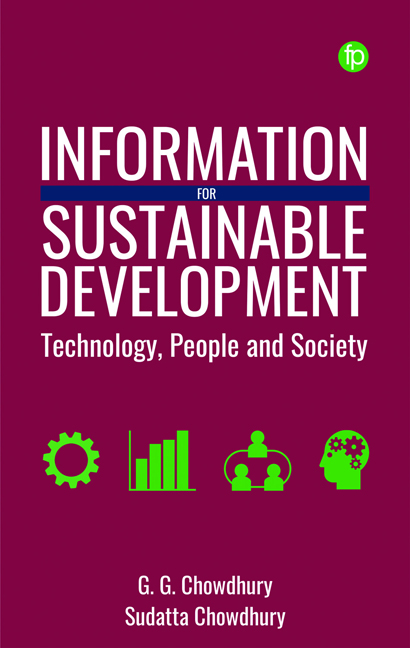Book contents
- Frontmatter
- Dedication
- Contents
- Figures
- Tables
- About the Authors
- Introduction
- 1 Data, Information, People and Society
- 2 Information and the Sustainable Development Goals
- 3 Sustainable Development Goals: Targets and Indicators
- 4 Data, Information and Progress in SDGs
- 5 Capacity, Co-operation and Sharing of Data for SDGs
- 6 People and the SDGs: the Digital Divide
- 7 People and the SDGs: Access to Data and Digital Skills
- 8 Information Skills and the SDGs in Everyday Life
- 9 Information, Education and Sustainable Development
- 10 Research and Development Around the SDGs
- 11 Information Education, Research and Professional Developments Around SDGs
- References
- Index
5 - Capacity, Co-operation and Sharing of Data for SDGs
Published online by Cambridge University Press: 13 April 2024
- Frontmatter
- Dedication
- Contents
- Figures
- Tables
- About the Authors
- Introduction
- 1 Data, Information, People and Society
- 2 Information and the Sustainable Development Goals
- 3 Sustainable Development Goals: Targets and Indicators
- 4 Data, Information and Progress in SDGs
- 5 Capacity, Co-operation and Sharing of Data for SDGs
- 6 People and the SDGs: the Digital Divide
- 7 People and the SDGs: Access to Data and Digital Skills
- 8 Information Skills and the SDGs in Everyday Life
- 9 Information, Education and Sustainable Development
- 10 Research and Development Around the SDGs
- 11 Information Education, Research and Professional Developments Around SDGs
- References
- Index
Summary
Introduction
In a 2022 UN report, the Secretary-General of the United Nations commented:
While considerable progress has been made in building stronger data and statistical systems for Sustainable Development Goal monitoring, significant data gaps still exist. Gaps in terms of geographical coverage, timeliness and the disaggregation levels of global Indicators make it difficult to fully comprehend the pace of progress, differences across regions and who is being left behind. Greater investment in data and strengthened data capabilities will be crucial in getting ahead of crises and triggering earlier responses, anticipating future needs, preventing crises from becoming full-blown conflicts and designing the urgent actions needed to realize the 2030 Agenda for Sustainable Development.
(UN Economic and Social Council, 2022, 3)
Co-operation, capacity building and data sharing have been identified as some of the key requirements for achieving the SDGs, and SDG17 has been specifically created to ‘strengthen the means of implementation and revitalize the Global Partnership for Sustainable Development’ (UN Statistics Division (n.d.d). However, several reports and research publications point out that although we are more than halfway through the period of achieving the Targets (by 2030) since the SDGs were first adopted by the global community in 2015, several data-related challenges still exist. The Cape Town Global Action Plan for Sustainable Development Data (CTGAP) report (World Bank, 2023) notes that many gaps remain, particularly with regard to national statistical capacity in low- and middle-income countries, and financing of data and statistics. Data gaps, timeliness and availability of data have been identified as some of the key challenges for achieving success in the SDGs. Some of these challenges have been discussed in Chapter 4, and some more are discussed in this chapter in the context of specific SDGs and countries.
Data gaps
Availability of reliable and comparable data on SDGs is often a major challenge. Analysis of the Indicators in the Global SDG Indicators Database (United Nations, 2021, 5) reveals that:
■ fewer than half of 193 countries, or areas, have internationally comparable data for 5 of the 17 SDGs
■ the lack of country-level data is particularly worrisome for SDG13 (climate action), where, on average, only about 1 in 6 countries have data Available
- Type
- Chapter
- Information
- Information for Sustainable DevelopmentTechnology, People and Society, pp. 83 - 100Publisher: FacetPrint publication year: 2024

